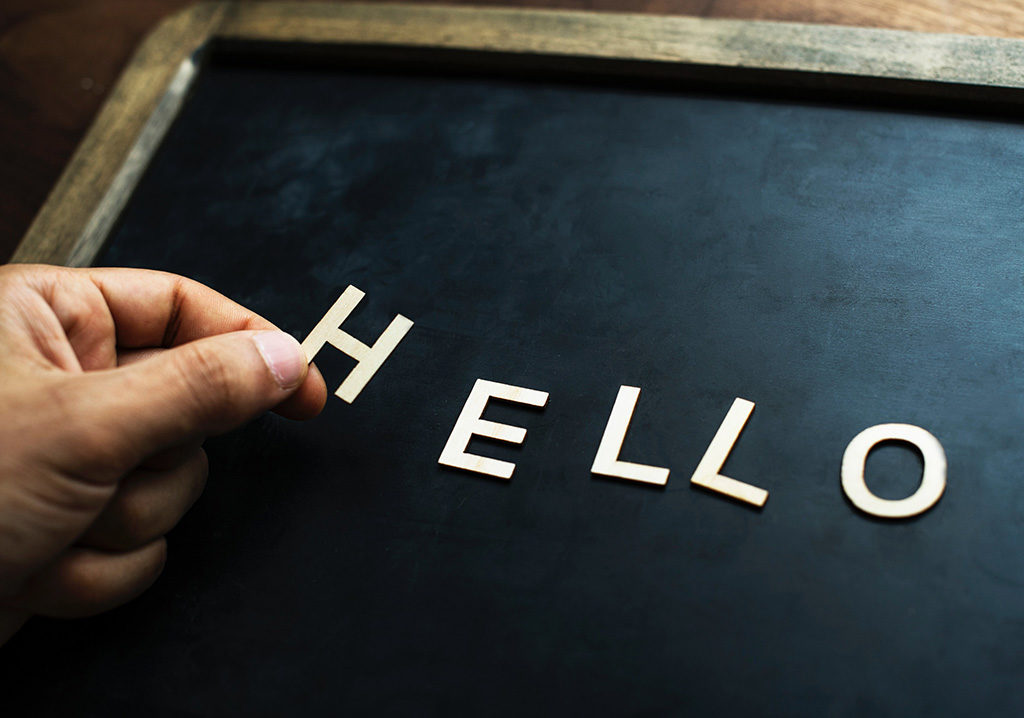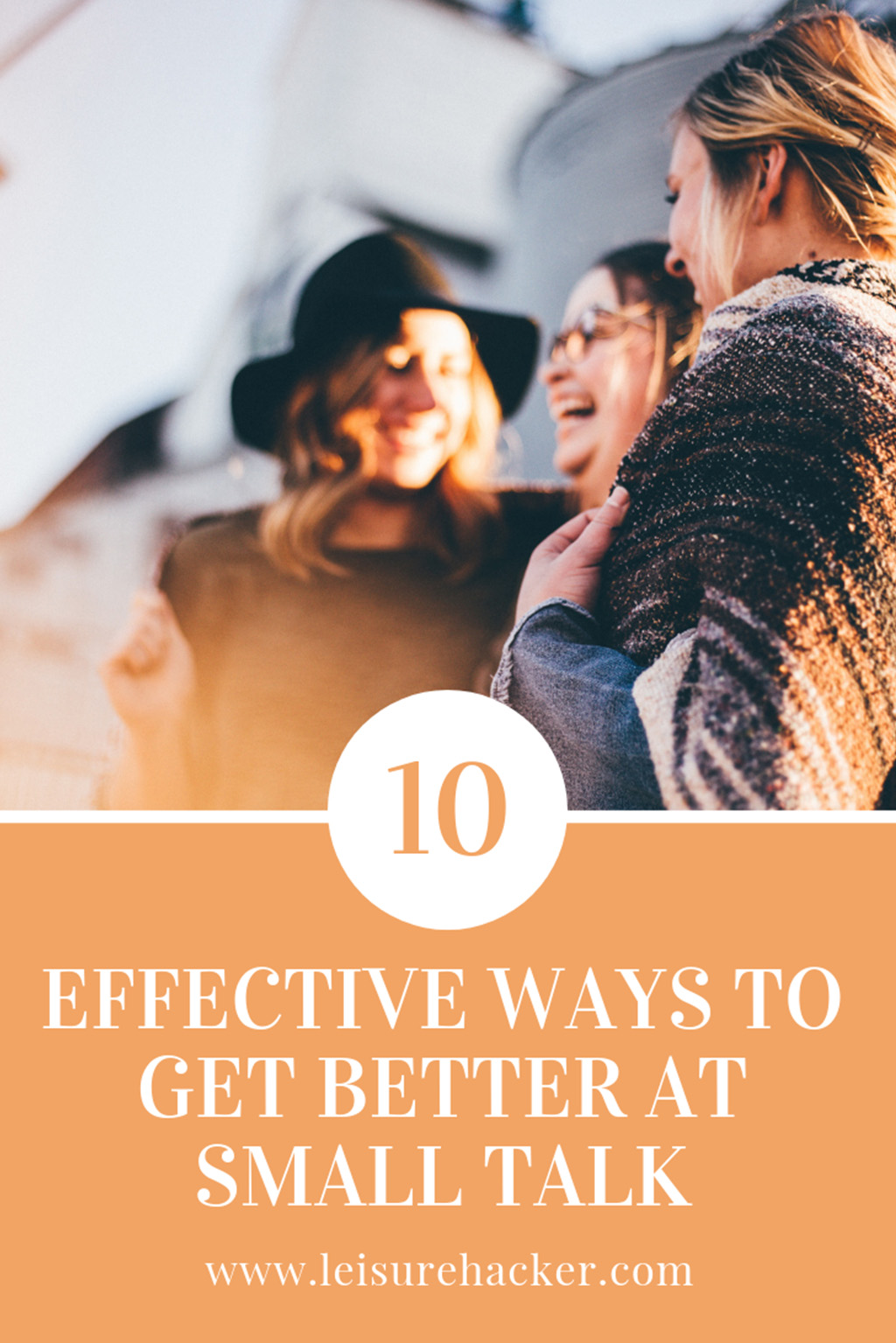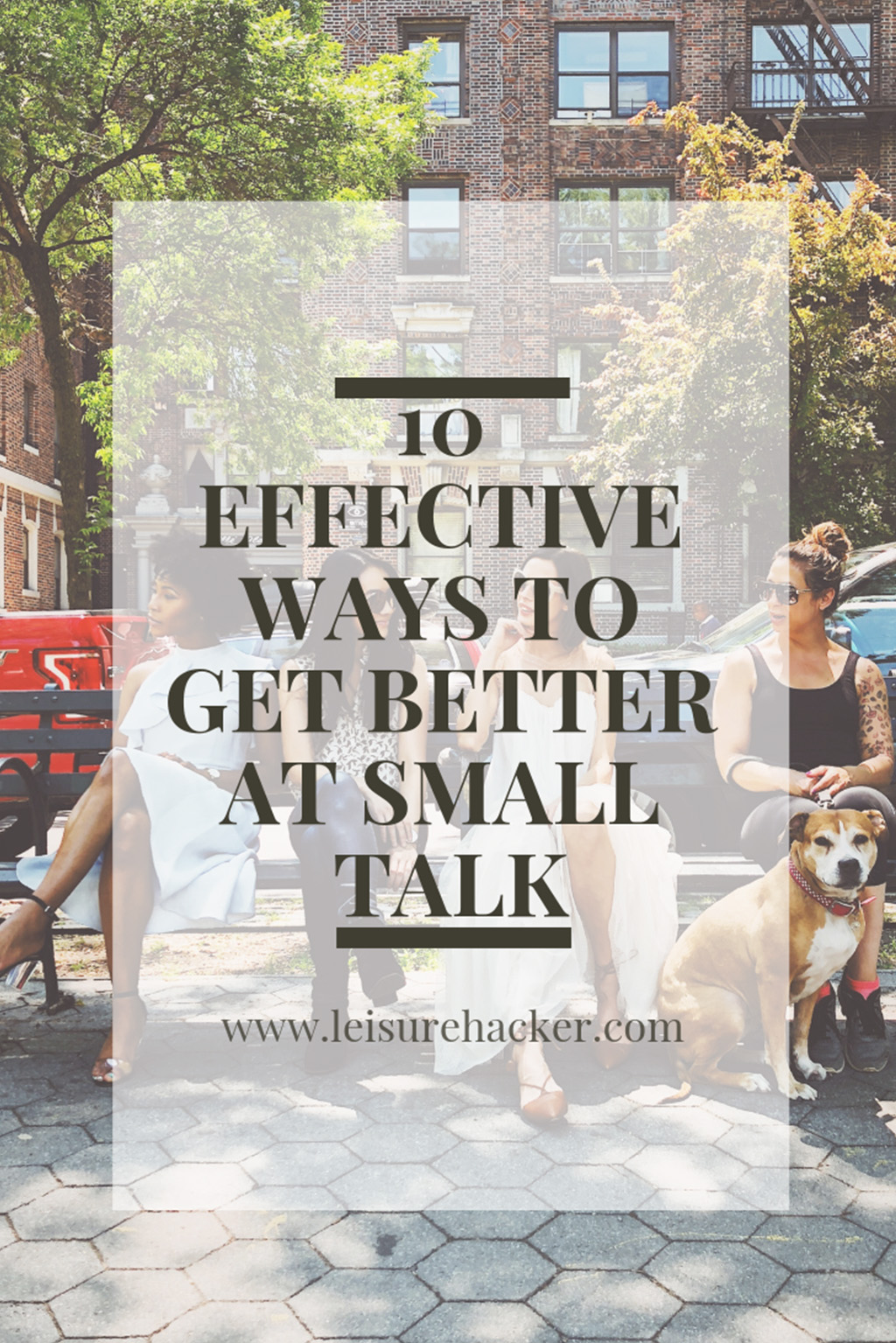10 effective ways to get better at small talk
March 2, 2019
Does just the thought of making small talk makes you feel uneasy? You’re not alone.
Small talk can be unpleasant, awkward, and even stressful — but it could also lead to new connections, meaningful conversations, learning new things and even unexpected opportunists if you know how to do it right. And the good news- Small talk is a skill and one that can be easily learned.

I, like most people, prefer having deeper and more meaningful discussions. I think I’m awesome when it comes to one-on-one conversation because I’m really interested in other people’s lives, I LOVE listening to stories and well yeah – I also love giving advice. But when it comes to simple small talk – just the thought of it makes my stomach turn a bit.
To start with- I hate talking about meaningless stuff. Come on, nobody cares about the weather unless you’re talking to a meteorologist and you’re wondering what to wear tomorrow. Also, I used to be bad at improvising answers (and questions) – having every semi-surprising question make my palms sweat. Yeah, ‘Small talk’ is not a small matter at all (no more size jokes, I promise…).
Small talk or big talk?
“Full talk” seems to have a better reputation when it comes to impacting our social life and relationships. Moreover, studies show that engaging in substantive conversations is linked to greater happiness and well-being.
But, small talk is not less important because it enhances social connections and creates better interaction that leads, in the end, to more substantial conversations. By the way, small talk is also important with people we already know. When you talk to someone about meaningless, even mundane daily stuff (like work gossip or a traffic jam) you allow the relationship to deepen in the sense of giving each other insight into your lives.
Whether you’re dating, networking, or socializing, knowing how to have a good chit chat is a must. And it can be easily learned.
Here are 10 effective ways to get better at small talk:

1. Show interest
Yes, we have established already that no one actually cares about “small talk” subjects. But being indifferent about the conversation will immediately show and will make the conversation fade out slowly but surely. That’s why showing interest will make you a “small talk” pro.
First, lose the preconception that the conversation will be meaningless and approach it as an opportunity. Every new person you meet could be a potential friends/partner/client/could teach you something or could be the gateway to the next great thing. The beauty is that you can never know so approach every new person with excitement instead of anxiety.
Secondly, Channel your inner Curious George. People generally enjoy talking about themselves so asking them questions will always score you extra points. Try going pass the boring “where are you from?”, “what do you do for a living?” and try asking good questions like “Do you have any non-work related projects that you’re working on right now?” or “What are you reading/watching that might be interesting?” (More on how to ask good question coming up…).
If you’re in a social situation, nobody actually wants to talk about work stuff but they WILL be happy to chew your ear off about their saturday bike trips or their new camera.
Pro tip: people love hearing their own name. So, if possible, try to say their name at least twice during the conversation.
2. Listen
To keep the talk going you actually have to listen or, at least, give the impression that you’re listening. Nod your head occasionally, give a subtle emotional reacting every now and then – a little gasp with your eyes widely open – you know the drill…And of course – ask follow-up questions to keep the ball rolling.
But whatever you do – don’t spend the whole time they talk coming up with answers or thinking ‘OMG what am I going to say next?’- That’s not listening.
Be attentive
Take a deep breath and actually pay attention to what they’re saying (both verbally and otherwise). And if you get stuck with coming up with a good answer or at least a good follow up question – two of my favorite approaches are simply saying: “Tell me more” or just paraphrasing and reflecting on what they just said. These two strategies show the other person you genuinely care about what they have to say.
And PLEASE, resist the urge to hijack the conversation and immediately spin it back to you. “Oh, you like surfing? Me too! I just came back from a Sri Lanka…” NO! I know you only do it because you’re happy to find common ground and you’re super excited to talk about it (I know it because I used to do it all the time) but allow the other person to talk without interrupting them. Good advice in general if you’re as an impatient talker as I am.

3. Pay attention to body language
We all know that sometimes how you say something can be more important than what you say so pay close attention to your (and your partner’s) body language as it conveys a message. I can write a whole blog post just about this but in a nutshell for now:
Make eye contact
Best way to show someone you’re listening to them and that you’re not bored. It took me some practice but now I enjoy staring deeply into people’s eyes as they talk (in a totally non-creepy kind of way). If you find it difficult or embarrassing just stare at one eye at a time (I swear that helps) or look just above the other person’s eyes. But never look to the sides or behind the person as it may seem like you’re seeking a way out of this conversation.
Mimic and mirror
Studies show that subtly mimicking the person you’re talking to sends signals that you’re engaged and interested. This is an ancient process rooted in the brain’s Mirror Neuron System. The key word here is SUBTLY. This should be almost unnoticed gestures like crossing your legs or leaning in the same direction.
Lean closer
Psychologists have shown that the distance between two people acts as a proxy for how much a person likes someone else. So your body should be slightly angled towards the other person. Of course, make sure your hands aren’t crossed in front of you but that you send out welcoming, warm vibes to the other person.
Smile
We now know that people naturally (and unconsciously) mirror the body language of the person they’re talking to. And we know that Smiling can trick your brain into happiness so 1+1= well, you do your math.

4. Ask open-ended questions
In order to make the talk a bit more interesting try to avoid as much as possible banal dead-end questions that use “what” or “where” like “What do you do?”. Instead, try asking open-ended questions that require more than a one-word reply, using “how” and “why”.
Open-ended questions create space for people to feel comfortable to elaborate. When you ask someone “what’s up?” you both know that you expect a short concise answer and not their whole life story. However, when you ask someone “How was your day?” or “What was the best part of your weekend?” it will encourage them to share some more details and come up with a more thoughtful response.
5. Be interesting
You can’t hold a conversation relying solely on the other person. If you expect interesting answers, give out interesting answers. Make sure your answers won’t lead to dead ends or make your conversation partner jump through hoops getting information to work on.
Expand your basic answers by adding some extra information that might lead to more conversation topics or common grounds. For example, when someone asks “where are you from?”. Instead of a “just”: I’m from Tel Aviv. I might say “I live in Tel Aviv because I’m such a beach bum that can’t live too far from the sea (true story by the way).
Share information
When someone enquires “How’s school going?” or “How’s work?” don’t just give out an unoriginal “fine” answer. Try to give a little more information by saying “It’s going well! I actually just started a new class on blah blah blah”. Or “Been busy, I’m working on an amazing new project regarding blah”.
If you have nothing interesting to say right now (living-your-best-life-red-alert) just express your wishes: “Work is so crazy, can’t wait to start planning my dream vacation to….” (You might even get some great tips out of it).
Try these winter and summer fun activities so you’ll hav stuff to talk about all year long.
Of course, you can always come prepared with a funny, semi-personal story about yourself and just throw in a “You won’t believe what happened to me today” as a conversation starter.
Pro tip: find the right balance in your conversation flow. Asking too many questions might feel eventually like an interrogation. Equally, stress might make you babble on an on, trying to fill the awkward silences. Try to balance it out according to the situation.
6. Be willing to learn
If there is one thing people like to do, maybe even more than just talk about themselves, is to give advice and share their wisdom with others.
Use this as an opportunity both to get the chat rolling, making your partner feel awesome AND to learn something new. Giving advice makes people feel smart, useful and appreciated. No need to say- never ask for professional advice in social events (no one wants to talk about their job when sipping on chardonnay).
We all admire the wisdom of people who come to us for advice |Arthur Helps
Use phrases like “what did you mean?”, “can you explain that further?” because asking people to elaborate will get them talking for at least another couple of minutes.
Use their answers for great follow up questions: “Oh, You live in ….? I was just planning to go there – any good recommendations for things to do/eat around?
Use their hobbies for advice. They’re an amateur cook- ask for a good recipe, they’re fashion-obsessed- ask for store recommendations or how to pair your new jacket. You get the point…
If you want to take your newly found relationship a step further, send them a text/e-mail a few days/weeks later thanking them for the great advice/recommendation – it will instantly win you extra points for the future.

7. Come prepared
Especially if you’re not good at this – come prepared. On the day of a social function or a business event, take time to do your homework. Stay aware of current events so when you have nothing to say you can use a “Hey, did you hear about …”
Remember: you don’t really know the person you’re talking to so steer clear of money, religion or politics related topics. Keep things light and on a positive note.
F.O.R.E
When all else fails, go with the FORE, no, not the force, the FORE – A default topics technique.
F-amily: Do you have kids? Where is your family from? How long have you lived around here? Do you have any brothers or sisters?
O-ccupation: What do you do for a living? What do you enjoy most about it? What is it like being a …….? Have you always been a ……? What attracted you to this profession?
R-ecreation: What do you do for fun? Do you have any hobbies? How do you like to relax? What do you usually do on the weekends?
E-ducation: where did you go to school? What was your favorite subject? What would you study now just for fun?

8. Compliment
At the end of the day, small talk is just a fun, casual way to meet and get to know people. Emphasis on the FUN part. Try to make people you talk with feel good after having met and talked to you. One of the best ways to do so is to compliment them, sincerely.
Furthermore, compliments are good both for the recipients and for the people who give them. When you give thoughtful praise to another person, it amplifies your self-confidence and nourishes your self-esteem.
The easiest compliment when small talking is of course style. In order to give a successful compliment, the most important part is being genuine and creative. Go beyond “you look great tonight” or “I like your outfit” and try to be specific about a special item, the unique pairing of clothes etc. sometimes jewelry will have an extra story behind them that will open up the conversation.
Also, check out this and this list of compliments for great ideas.
Tip: remember to be a gracious compliment receiver as well. Don’t start with downing it down or useless explanations. Just smile and say thank you.
9. Wrap it up
People usually remember the first and last things in a conversation best so make sure you end the talk on a high note (before you run out of things to say and the conversation dies out).
Thank the person for your talk and let them know that you have enjoyed the conversation. If you can reference something from the conversation that meant something to you it will make them feel important and will show that you’re not cutting them short because you’re bored – Say, ‘I’ve enjoyed talking to you about …….., and I hope to talk to you again”.
Then try to be as graceful as possible using some kind of excuse: ” I need to grab some food, I haven’t eaten all day” or “I must go say hello to…. or they’ll kill me! *Light laughter*”
10. Practice
You know practice makes perfect so try using these tips wherever you go – the cashier at the supermarket or just a random person on the bus (tactfully of course). Small talk is a skill and eventually, you’ll begin to feel more comfortable starting and maintaining interesting conversations. Make a game out of it and you’ll see you’ll start to enjoy it. When you are happy to talk to someone and have fun with it, no talk will feel like small talk.

I used to get extremely bored with meaningless conversation and well, with people LOL. Unfortunately, I found myself talking to a lot of new people lately – what can I say – when you’re an entrepreneur and you are single small talk becomes you’re bread and butter. It takes a while to get used to it but ever since I started asking more interesting questions and wasn’t afraid to give more interesting answers my bread and butter became delicious cake.
But I want to hear from you! How do you feel about small talk? Do you have any tips for striking up a conversation? Please share with me in the comments.
Now go out there and chit chat your butt off!
XX,
Jeni
Leave a Reply Cancel reply
GYST
*
My 3-step formula to increase productivity, reduce stress, and create more balance in a busy world.
*Get Your Sh*t Together:
A FREE Guide to Organizing Your Life
Get the free guide now!
From Task Overwhelm To Effortlessly Efficient
THE 5-DAY PRODUCTIVITY CHALLENGE TO ORGANIZE & PRIORITIZE YOUR TASKS
TELL ME MORE!
Say Goodbye to 'Task Chaos' and the feeling of never truly getting ahead, and say Hello to a more organized, focused, and accomplished you!
Fantastic article. Well written with thoughtful and actionable suggestions. Thank you for taking the time think about, then write AND edit for a wonderfully helpful essay.
Thank you so much and I’m so happy it resonated Eric!!